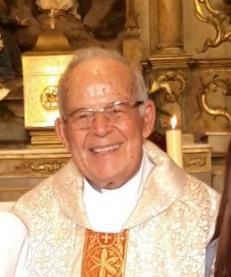Ascension Year C
(Acts 1:1-11; Psalm 46(47); Heb 9:24-28, 10: 19-23; Luke 24:46-53)
Twice today we hear about Christ’s ascension into heaven. Luke’s Gospel ends with the ascension shortly after Jesus had walked with the two disciples on the way to Emmaus. Acts starts with Jesus’ ascension after appearances over 40 days. This “double ascension” links the two parts of Luke’s single work.
The Psalm calls on all peoples to accept God as the true God and as universal king.
Hebrews emphasises that, as “the supreme high priest”, Jesus “appears before God on our behalf”, after shedding his own blood in a sacrifice that need never be repeated.
Luke’s Gospel opened in the Temple in Jerusalem with the angel appearing to Zechariah, and ended with the disciples joyfully praising God in the Temple, still in Jerusalem. Acts starts in Jerusalem but finishes in Rome. Jesus’ earthly ministry was “to go to the lost sheep of the house of Israel”. His ministry started and finished in Israel. But gradually the Apostles, guided by the Holy Spirit, came to realise that they were to preach “repentance for the forgiveness of sins” “to all the nations, beginning from Jerusalem”. Acts shows how Jesus Christ continues his presence through the Church, spreading the gospel worldwide. Judaism could not contain Christianity, which had to break away from the Temple, with its daily sacrifices.
(Acts 1:1-11; Psalm 46(47); Heb 9:24-28, 10: 19-23; Luke 24:46-53)
